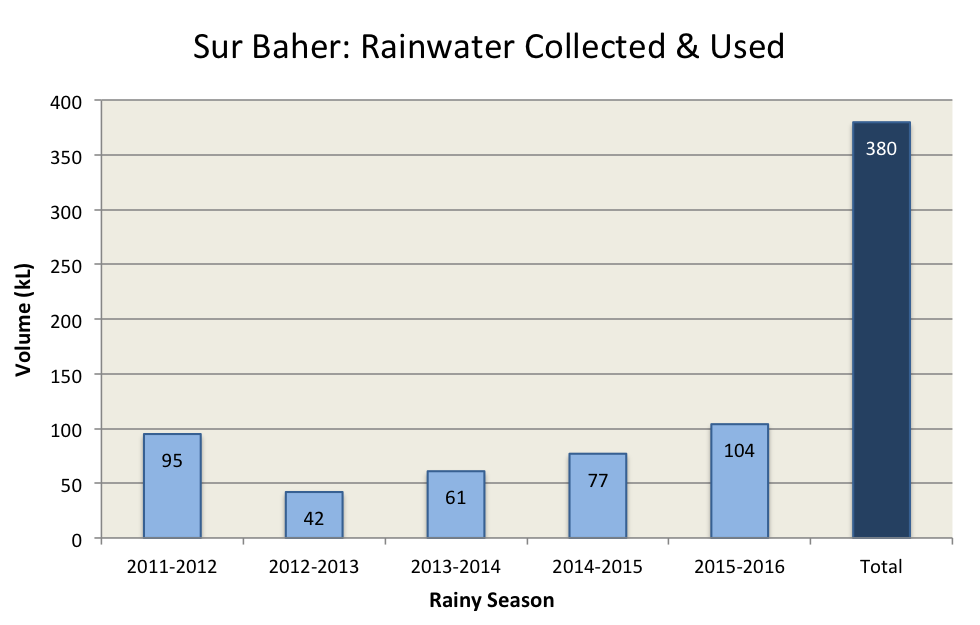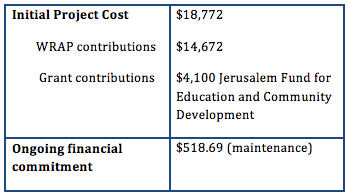 Basics: The Sur Baher Girls School in East Jerusalem was selected as WRAP’s pilot project, serving 800 Arab girls (grades 1-12). In February 2011, WRAP completed construction on its first rain barrel harvesting system. The formal dedication of the project took place on May 19, 2011. Naomi Sur, Deputy Mayor of Jerusalem, participated as the keynote speaker, alongside WRAP’s delegation, and the school and community leadership.
Basics: The Sur Baher Girls School in East Jerusalem was selected as WRAP’s pilot project, serving 800 Arab girls (grades 1-12). In February 2011, WRAP completed construction on its first rain barrel harvesting system. The formal dedication of the project took place on May 19, 2011. Naomi Sur, Deputy Mayor of Jerusalem, participated as the keynote speaker, alongside WRAP’s delegation, and the school and community leadership.
Details: Rain is collected from the roof of the school during the rainy season (typically November-April), directed and stored in a series of rain barrels, then transported to the restrooms for toilet flushing. Additional water is also used for the school gardens, constructed as part of the environmental education curriculum. Assigned faculty administers an environmental education curriculum with subsets of students (referred to as water trustees). In particular, the water trustees learn about the importance and practice of conservation, including the interconnectedness of water within their community and surrounding ecosystem. Students are responsible for daily monitoring of the rain harvesting system, reporting rainfall, water collected, stored, and conserved.
 Results: As a result of the project, the school has realized reduced dependency on the municipal water provider and monetary savings on its water bills. The students have an improved understanding of how the rainwater harvesting system operates, value of water, and impact that individual and institutional actions can have on the surrounding environment and communities – knowledge that is carried home with the students and transferred to parents, siblings, and neighbors.
Results: As a result of the project, the school has realized reduced dependency on the municipal water provider and monetary savings on its water bills. The students have an improved understanding of how the rainwater harvesting system operates, value of water, and impact that individual and institutional actions can have on the surrounding environment and communities – knowledge that is carried home with the students and transferred to parents, siblings, and neighbors.
Monthly reporting from February 2011 – April 2016 confirmed that WRAP’s harvesting system at Sur Baher collected and used over 380,000 liters of rainwater.
Ongoing Commitment: The principal, faculty, and surrounding community continue to be committed to and enthusiastic about the project. WRAP’s delegation visits the school on an annual basis, continues to fund the routine maintenance of the harvesting system and educational program, and pursues additional avenues to supplement its current efforts. WRAP is supporting programs to connect students at Sur Baher with students from diverse backgrounds in nearby communities and in the US through their shared experience of rainwater harvesting. For instance, WRAP has facilitated the collaboration of students and teachers at Sur Baher and at the Albuquerque Academy in New Mexico who have worked together to develop a joint blog, plant4peace, to link the environmental clubs at the two schools. The blog allows the students to share pictures and stories of their environmental projects.
 How it’s possible: Contributions by the WRAP membership funded the initial project installation. The Jerusalem Fund for Community and Education Development provided a grant to fund the expansion of the rainwater harvesting system, increasing the rain barrel storage capacity and resulting number of restrooms serviced. WRAP’s grassroots partners, EcoPeace Middle East and Only Green Environmental Center, continue to be instrumental in overseeing and coordinating a variety of parallel environmental and community-building initiatives within the school.
How it’s possible: Contributions by the WRAP membership funded the initial project installation. The Jerusalem Fund for Community and Education Development provided a grant to fund the expansion of the rainwater harvesting system, increasing the rain barrel storage capacity and resulting number of restrooms serviced. WRAP’s grassroots partners, EcoPeace Middle East and Only Green Environmental Center, continue to be instrumental in overseeing and coordinating a variety of parallel environmental and community-building initiatives within the school.


